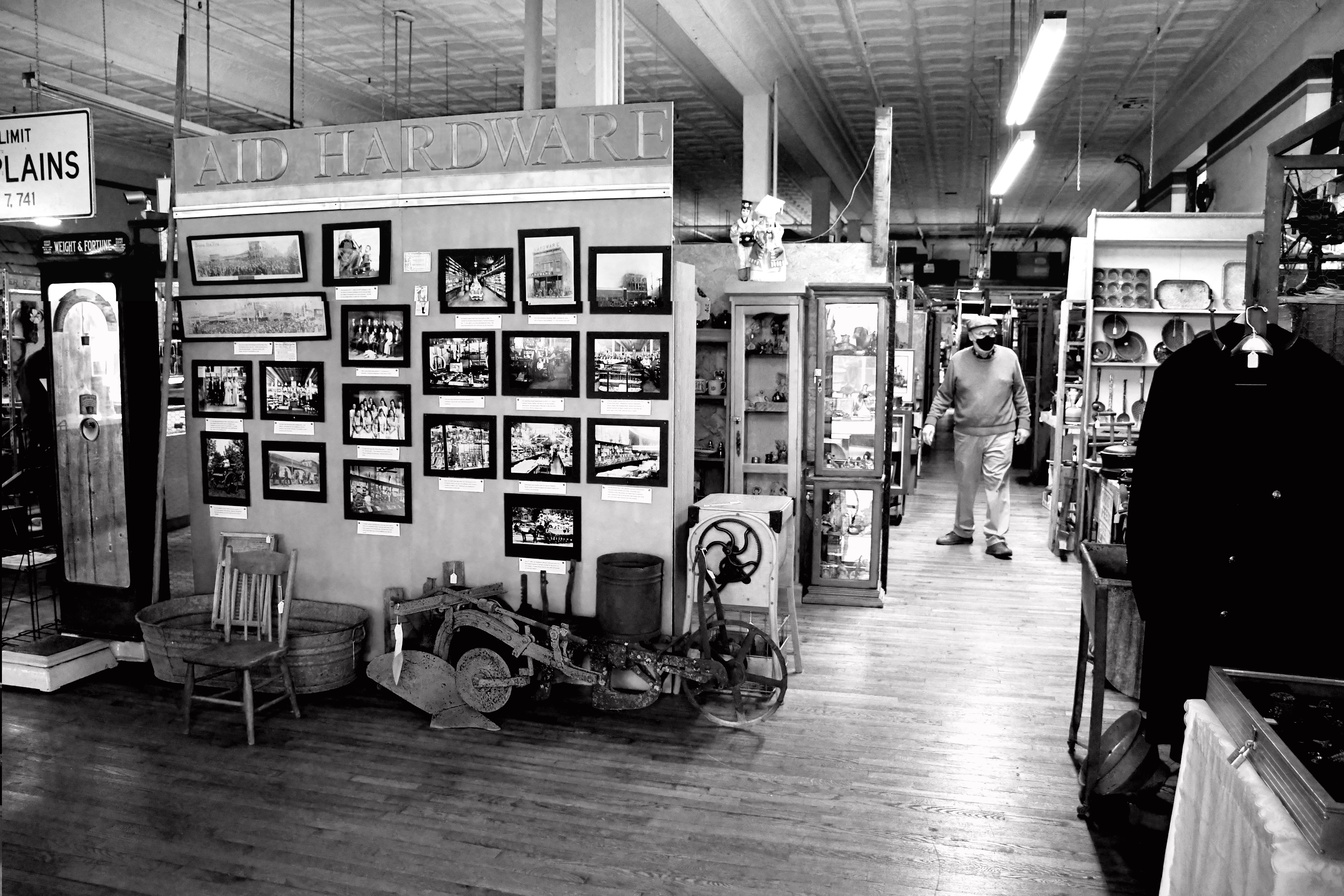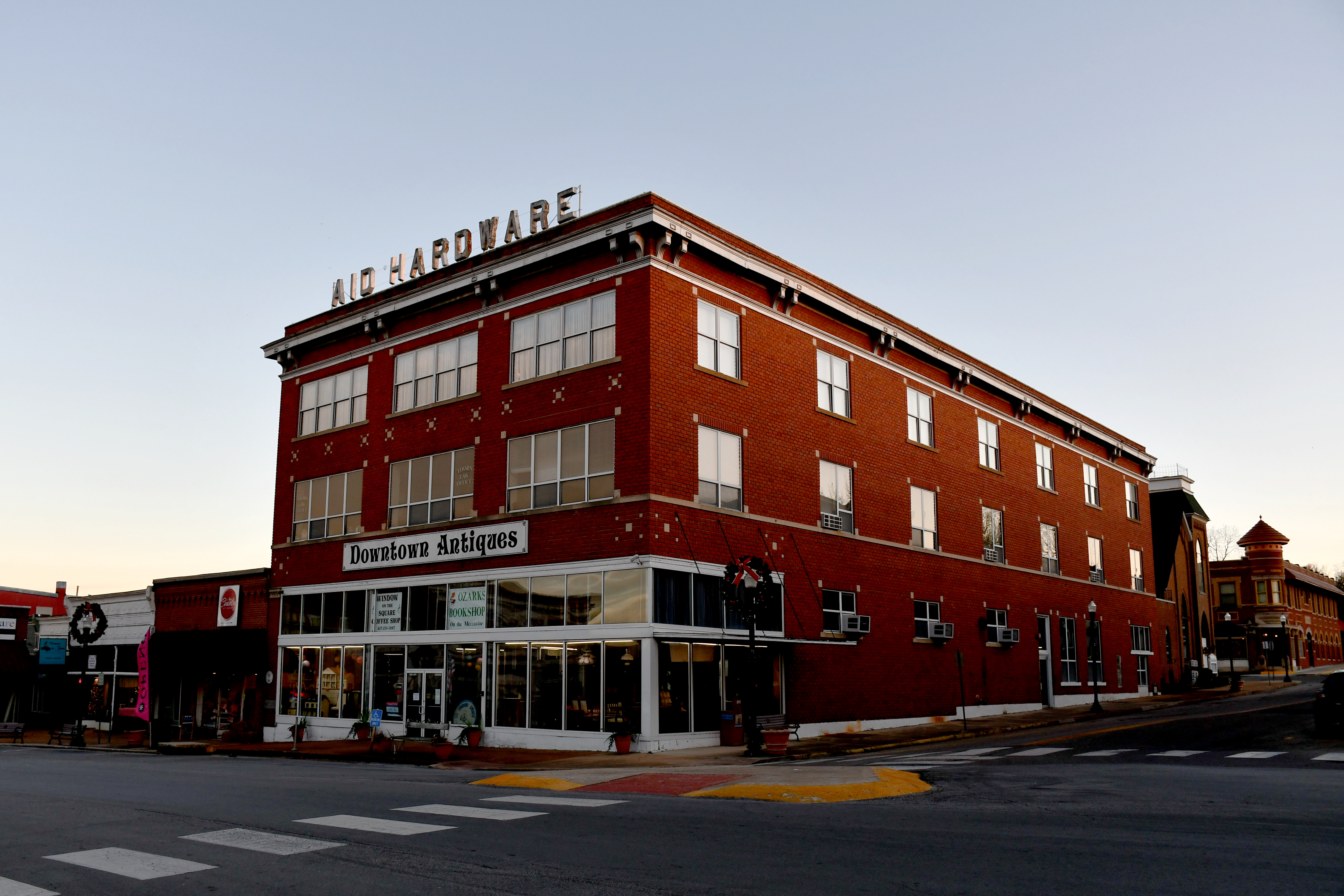
WEST PLAINS - Toney Aid’s footsteps across the well-worn wooden floor of his family’s store speak to the here and now, and echo those made many decades and generations long gone. But if things had worked out the way Aid previously planned, he likely wouldn’t have been there to cross the floor and push open the door on a recent sunny afternoon.
He knew I was coming to visit. But in the grand scheme of things, a younger version of himself didn’t expect to be there at all. Because if things had worked out as he’d expected, Aid — a well-known historian, local business advocate and civic leader — shouldn’t have even been in West Plains past his growing-up years.
He could’ve been in other parts of the country, using his advanced art history expertise in larger metropolitan areas.
But one day, a certain professor came to class.
“I’d been thinking for a couple months, ‘Do I want to go to New York, Philadelphia, Austin, Los Angeles, Chicago for museum work?’” Aid says of working on his master’s degree in the 1970s at the University of Missouri-Columbia, noting that he was likely going to head to Harvard or Yale for further study.
“Then another professor from another department came and he said, ‘You know, you don’t all need to become PhDs.’ He said, ‘Missouri, as a state, needs a lot of people with master’s in Art History to go back to their towns and help change that town.’
“And I took it to heart and I came back.”
That decision led to significant influence on both the past and future of the Howell County seat. In the years to come, Aid would publish books, amass photo collections and restore 17 buildings to historical standards; promote business opportunity through work as a small business owner, and as a leader with the Ozarks Small Business Incubator; and support civic engagement efforts through a variety of groups and organizations.
But, like the professor’s profound proclamation, history also would’ve been different if C.T. Aid, his great-grandfather who trained as a tinsmith, hadn’t come to West Plains as a young man in the late 1800s and started the store in which Aid now stands.
“Right after the Civil War, when he was around 12 or 14, he apprenticed in Philadelphia and he got all his tin tools and put them in a pack and came west,” says Aid of his great-grandfather. “First he went to Rogers, Arkansas. A salesman from Shapleigh Hardware out of St. Louis convinced him the railroad was coming through West Plains and it was going to be a boom town. The salesman financially backed him and he started the store here.”

That store building isn’t the same one that Aid walks through today. The first one burned in the early 1900s when the telephone office, housed on an upper floor, caught on fire. But while not planned or pleasant, the fire allowed for the store to come back bigger and better than ever: It was rebuilt to the 42,000-square-foot, three-story defining destination that’s on the square today.
“It was known as the best small-town store in Missouri,” says Aid. “It was written up in the national retail magazines.”
Aid speaks of his great-grandfather, who died before he was born, but lives through his name.
“My first name is the letter C because my great-grandfather was C.T. Aid,” he says. “Mom and Dad wanted me to be C.T. Aid, but I had a cousin born a month before me and they named him Charles, which is my great-grandfather’s first name. So they said, ‘Well, put it on the birth certificate as ‘C’ and we’ll think of something — and they never did.”
The elder Aid was an excellent promoter as well as hardware store owner, often offering unorthodox methods to get people to the store.
“Anything he could think of,” Aid says of his ancestor’s knack for promotions.
Looking back around a century, Aid shares the example of “Baby Days,” when mothers brought their children to the store to see how many could be included in a photo on a particular day.
“He got 170 one time; all the mothers are in their white dresses and all the babies are in christening gowns,” says Aid. “He lined them all up down the street and had one of these panoramic cameras.”
And then he offered money, no work at the store required.
“He had a bucket of silver dollars under the counter, and if you could carry a bag of lead shot around the square without dropping it, you won all the silver dollars,” says Aid. “You had to put in a silver dollar to try. So all these big guys from the lumber woods and farmers would come in. … Nobody ever won it.”
There was an opportunity for a $20 gold piece to whoever could show up to the store with the most people on a wagon. A rural church a few miles from town figured out how to beat the system by walking most of the way to town behind a large hay wagon pulled by several horses.
“When they got to the end of main street down here, they all climbed on,” says Aid.
There were other contests, like for biscuit baking or flower growing. Then there was the day in 1916 when a couple wed in the store — their identities unknown to the public until the ceremony — in an effort to bring people in its doors.
That process started with a group of girls who worked at the store and were tasked with finding the happy couple.
“He told them that if they could find a young couple, and they would agree to be married here in the store, that he would give them everything they needed to set up housekeeping,” says Aid. “Kitchen table and chairs, stove, set of pots and pans, set of dishes, all that. And they came up with someone. He advertised it. He packed the store; decorated with crepe paper and bells and things. Just packed. They came down the stairs to the landing and they were married there. They got all that stuff, and he had a great sale.”
That moment came full circle some 60 years later, when an elderly man and woman walked in the store.
“In 1976, I was sitting at the desk there and I looked up and here came this old couple,” recalls Aid. “They said, ‘You won’t believe this but we were married in the store.’ I said, ‘I believe it, I’ve got pictures.’”
That meeting, some 46 years ago, happened just two years after Aid decided to come home and work at the hardware store, becoming the fourth generation of his family in the business.
“Toney Aid has joined his father’s business, Aid True Value Hardware, according to the West Plains Daily Quill,” reported the Springfield Leader and Press in February 1974. “A graduate of the University of Missouri - Columbia, Aid will serve as assistant manager.”
Those were days when things were different. Back then, business was central to the West Plains square and the Aids’ store was at the heart of it all. It also sold a wide variety of items, including those that weren’t traditionally found in a hardware store such as toys, dishware, fabric, candy and more.
But with changing times — and the introduction of Walmart, of which Aid shares West Plains was an early store location — so did the business. As the model shifted, he speaks of an effort to compete.
“Toney thought he was smarter than them (Walmart) and he wasn’t,” Aid says of himself, giving an example: “I decided I was going to outsell them on lawnmowers one year. I bought three semi-truckloads of lawn mowers. Sold riding lawn mowers for about a $30 profit and then filled them with gas and filled them with oil and had to take care of them.
“Dummy.”
Ultimately, Aid Hardware shut its doors in 1990 after being open for 105 years. At the time, it was one of three hardware stores that Aid owned: Others were located in Willow Springs and Salem, Ark., and have also closed.
“We’re sorry to be leaving, but we’re proud of the prosperous, growing, healthy place West Plains is today,” Aid said through newspaper pages in October 1990. “And we’re proud to think that we were part of making it that way.”
The news was shared in papers across the region, including through a column by James J. Fisher in the Kansas City Star in November 1990.
“About three years ago we noticed that the crowds weren’t coming,” said Joe Aid Jr., Aid’s father, in the Star. “It was easy to figure out why. There’s a big new shopping mall out west of town with a food market and discount stores and other shops. The traffic pattern had changed. People didn’t have to come down to the square anymore.
“And the simple fact was that our customers had gotten old. People who used to come in here for plow points and fencing and fishing reels and tinware and lamp wicks aren’t buying anymore.”
“It’s hard to imagine a downtown West Plains without an Aid Hardware,” said a former clerk in a newspaper article announcing the store’s closing.
But the Aids’ last day of owning a store on the square wasn’t when they expected. A year after the hardware store shuttered, it found new life — as an antique mall, run by Aid and his father.
“Gone are the bolts and nuts, the saws and hammers, and all the rest. In their place are thousands of other items, all labeled, priced and in some cases, thankfully identified as to just what they are,” columnist Fisher wrote about the store’s next chapter in 1995.
Downtown Antiques has now been open for around a third of the time the building saw hardware sales, and change has come to this chapter, too. Instead of vendors, Aid owns every lock, stock and barrel himself. It contains a variety of unique antiques, including many with Ozarks ties — including local artwork and a bookshop section filled with works by local authors as well as vintage titles.

The building, too, has seen new life after being completely remodeled: The upper two stories feature apartments, including one in which Aid and his wife, Kathleen, reside. The apartment showcases piece after piece by local artists, often depicting Ozarks scenes, and also holds part of Aid’s collection of Native American pottery.
But it’s only one example of many buildings he has taken time to save.
“I’m working on the 17th (building) we’ve remodeled or restored,” says Aid. “We did four for national landmark status and tax credits, and all the others it didn’t pay to do that but we tried to do them all historically.”
Another local landmark Aid has been involved with in the past is Hodgson Mill, the iconic cherry-red structure in Ozark County that is seen on labels — for a company of the same name — in grocery stores. The Aid family owned it for around 60 years after the aforementioned great-grandfather bought the mill during the Great Depression. It was ultimately sold to new owners in the late 20th century when upkeep and flooding made it a significant time commitment.
“I almost got the city of West Plains to buy the water rights,” says Aid. “They were going to pipe it all the way over here. As long as you don’t deplete the flow of the river above or below, you can do that.
“I wanted to keep it in the family but couldn’t.”
Aid’s love of history extends past buildings: In the back of the store, the safe where money was once stored is now filled with photos showing an Ozarks captured in days gone by. Some of those fill multiple books he has authored.
But wait, there’s more!
Aid jumped into civic work upon returning to West Plains in 1974, a fact that’s evident by his service as president of the Howell County Historical Society just a year later when in his 20s. His local positions have been many over the years; one example is his leadership with the Harlin Museum, and his role in acquiring the famed Broadfoot charcoal sketches that depict Ozarkers from days long gone. He also speaks of his work with the West Plains Industrial Development Corporation, and, for years, as CEO of the Ozarks Small Business Incubator.
“We went all over the country visiting incubators and seeing what made successful ones and what didn’t,” says Aid of his time with the incubator. “I think if we would’ve just opened it up in a couple of years, it wouldn't be there.”
His contributions were recognized, at least in one instance, when he was given the Zizzer Alumni Award in 2014. It’s bestowed annually on a noteworthy West Plains High School graduate.
“The most obvious and visible contribution Aid has made is the revitalization of the West Plains Downtown,” noted information tied to the award. “He is truly a visionary. Where others see blight, he sees potential and acts on it. He uniquely combines his passion for history and historic preservations into relevancy for our community’s economic future.”
While he isn’t done, Aid looks back and notes that his education helped him have a unique perspective that influenced other areas of his life.
“When you’ve had a degree in art history or art or something, you look at things in a different way,” he says. “You see them differently.”


